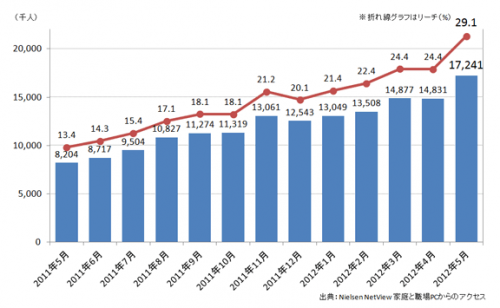Five Friday Facts #34

Facebook showing solid growth in Japan and Korea
Social networking sites are seeing multifold growth in usage in many of the Asian countries. Latest figures from Nielsen/NetRatings illustrate Facebook’s reach in Japan and Korea. According to their new report, Facebook visitors surfing from their PCs in Japan amounted to around 17.2 million in May, a rise from 8.2 million a year ago. In fact, Japan’s newfound love for Facebook is likely to be more apparent than the numbers suggest, as the report has excluded users who access Facebook via mobile devices. In Korea, Facebook still lags behind Cyworld which is a South Korean Social networking site. Despite the popularity of the nation’s local platform, Facebook’s trajectory sees it steadily growing to outdo Cyworld in visitor numbers within the next year.
 Google+ hits 250 million accounts
Google+ hits 250 million accounts
Vic Gundotra, Senior VP of Social Business of Google revealed at the Google I/O event that over 250 million accounts have signed up for Google+ with over 150 million of which are active users. In addition, out of 50% of its users sign in every day, spending an average of 12 minutes a day on Google+ stream. Gundotra has also shared that the Google+ team is focused on building great features, capitalizing on its advantage in search relevance, as well as making sure that Google’s existing products are infused with social interactions. Whether Google+ will reach its desired penetration level to compete with Social Media giant Facebook is still questionable.
Marketers love Facebook but don’t quite advertise there
Although many marketers are investing in Facebook, a significant percentage indicated in a recent survey that Facebook ads are not an essential part of their strategy. Of the 658 self-identified marketers, agency executives, media executives and marketing consultants in AdAge‘s survey, nearly 86% indicated that Facebook is part of their marketing mix. However, only 55% said they advertise on Facebook, and 86% said they would produce Facebook content without buying any ads on the platform. Nonetheless, Facebook’s ad revenues are expected to grow substantially over the coming years, surpassing $5 billion in 2012, according to eMarketer’s estimates. Some of that growth may come from mobile: Early data about Facebook’s new mobile ad products suggest that they are generating 2.5 times as much revenue per impression than their desktop counterparts. Interestingly, though 73% said they expected their social media advertising spend to increase, only 56.6% said they expect to spend more on Facebook.
Strategic Tweeting: Fewer hashtags and tweeting when people are busiest
The latest study by Buddy Media on effective tweeting strategies revealed that tweeting with fewer hashtags and sending out your tweets when people are the busiest could increase the engagement rates of your tweets. The study looked at the tweets of the top 320 brands on Twitter isolating factors that could possibly affect the tweet engagement rate – such as retweets and replies – and discovered that tweets sent between 8am and 7pm received 30 percent more engagement than tweets posted outside that timeframe. Interestingly, Buddy Media’s earlier report on Facebook engagement showed opposite findings. In addition, shorter tweets (100 characters or less) received 17% higher engagement than longer ones, and 100 characters appears to be the “magic number” on Twitter, because it leaves room for both a link and a username. Tweets with one or two hashtags receive 21% higher engagement than those with three or more of the little symbols. Using more than two hashtags typically leads to a drop in engagement.
Social Media is replacing traditional journalism
Today we receive news as and when it happens in real time, sometimes even before news organizations have a chance to report it. The digital information age that we live in has changed the way we obtain news. It is estimated that nearly half of all Americans get some form of news on social media, with 46% of people going online at least three times a week to get news. To top it off, online news sources have officially surpassed print newspapers in ad revenue. Most people turn to social media for breaking news. Can we trust the news that social media delivers to be accurate and factual? Check out the infographic here to find out how social media is changing the game.